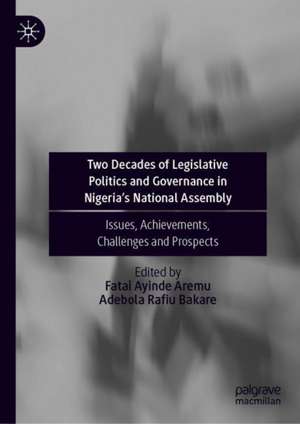Two Decades of Legislative Politics and Governance in Nigeria’s National Assembly: Issues, Achievements, Challenges and Prospects
Editat de Fatai Ayinde Aremu, Adebola Rafiu Bakareen Limba Engleză Hardback – 20 mar 2021
Preț: 790.38 lei
Preț vechi: 963.88 lei
-18% Nou
Puncte Express: 1186
Preț estimativ în valută:
151.27€ • 157.50$ • 127.83£
151.27€ • 157.50$ • 127.83£
Carte disponibilă
Livrare economică 17 februarie-03 martie
Preluare comenzi: 021 569.72.76
Specificații
ISBN-13: 9789813344549
ISBN-10: 9813344547
Pagini: 394
Ilustrații: XXXI, 394 p. 28 illus., 25 illus. in color.
Dimensiuni: 148 x 210 mm
Greutate: 0.68 kg
Ediția:1st ed. 2021
Editura: Springer Nature Singapore
Colecția Palgrave Macmillan
Locul publicării:Singapore, Singapore
ISBN-10: 9813344547
Pagini: 394
Ilustrații: XXXI, 394 p. 28 illus., 25 illus. in color.
Dimensiuni: 148 x 210 mm
Greutate: 0.68 kg
Ediția:1st ed. 2021
Editura: Springer Nature Singapore
Colecția Palgrave Macmillan
Locul publicării:Singapore, Singapore
Cuprins
Chapter 1. The Place of Legislature in Democratic Governance: An Introduction.- Chapter 2. The Legislature in Nigeria: Origin, Significance and Relationship with other Arms of Government.- Chapter 3. Legislative Politics and Governance in Nigeria’s Fourth Republic.- Chapter 4. Interrogating Voting Patterns in Nigeria’s Legislative Elections under the Fourth Republic.- Chapter 5. Committee System in Nigeria’s National Assembly: Issues and Challenges.- Chapter 6. Evaluating the Nigerian National Assembly’s Lawmaking Output and the Implications for Legislative Effectiveness.- Chapter 7. National Assembly as an Arena of Accountability Bargain: Issues, Challenges and Prospects.- Chapter 8. National Assembly and the Powers of Summons and Appointments Ratification.- Chapter 9. An Assessment of the Oversight Role of the National Assembly, 1999-2019.- Chapter 10. Leadership Crisis in Nigeria’s 8th Assembly: Implications for Institutional Efficiency and Intra-Organ Stability.- Chapter 11. Legislative-Constituency Relations in Nigeria: How Representative are the Representatives?.- Chapter 12. The Nigerian House of Representatives from 1999-2019: A Performance Assessment.- Chapter 13. The Nigerian Senate, 1999-2019.- Chapter 14. Giving Voice to the Voiceless: The Challenges of Women Legislators in Nigeria’s National Assembly.- Chapter 15. The National Assembly and the Paradox of Defection Politics in the Nigeria’s Fourth Republic, 1999 – 2019.- Chapter 16. Twenty Years of Legislative Politics and Governance in Nigeria: how far, how well?.
Notă biografică
Fatai Ayinde Aremu is a Professor of Political Science, University of Ilorin, Nigeria.He is presently a Directing Staff at the National Institute for Policy and Strategic Studies (NIPSS), Nigeria’s apex policy think tank. He is the author of Asymmetrical Foreign Policy Behaviour of Japan and China (2011) and co-editor of Introduction to International Relations (2012).
Adebola Rafiu Bakare teaches in the Department of Political Science, University of Ilorin, Nigeria. His research interest is on legislative studies, governance institutions, psephology and security studies. He is the founder and Executive Director of Centre for Legislative Research, Documentation and Training (CLRD&T).
Adebola Rafiu Bakare teaches in the Department of Political Science, University of Ilorin, Nigeria. His research interest is on legislative studies, governance institutions, psephology and security studies. He is the founder and Executive Director of Centre for Legislative Research, Documentation and Training (CLRD&T).
Textul de pe ultima copertă
This book unpacks two decades of Nigeria’s National Assembly spanning 4th–8th legislative sessions. It focuses on the core areas of legislative functions – lawmaking, appropriation, oversight and representation – in examining the achievements, challenges and prospects of the legislature. This is particularly important because Nigeria being the most populous country in Africa is a crucial bastion of democratic governance in the region. Therefore, conducting deep diagnostics of the federal legislature as the custodian of popular mandate and the anchor of accountability offered immense opportunity for learning that would catalyze further institutional reforms and democratic consolidation.
Fatai Ayinde Aremu is a Professor of Political Science, University of Ilorin, Nigeria.He is presently a Directing Staff at the National Institute for Policy and Strategic Studies (NIPSS), Nigeria’s apex policy think tank. He is the author of Asymmetrical Foreign Policy Behaviour of Japan and China (2011) and co-editor of Introduction to International Relations (2012).
Adebola Rafiu Bakare teaches in the Department of Political Science, University of Ilorin, Nigeria. His research interest is on legislative studies, governance institutions, psephology and security studies. He is the founder and Executive Director of Centre for Legislative Research, Documentation and Training (CLRD&T).
Fatai Ayinde Aremu is a Professor of Political Science, University of Ilorin, Nigeria.He is presently a Directing Staff at the National Institute for Policy and Strategic Studies (NIPSS), Nigeria’s apex policy think tank. He is the author of Asymmetrical Foreign Policy Behaviour of Japan and China (2011) and co-editor of Introduction to International Relations (2012).
Adebola Rafiu Bakare teaches in the Department of Political Science, University of Ilorin, Nigeria. His research interest is on legislative studies, governance institutions, psephology and security studies. He is the founder and Executive Director of Centre for Legislative Research, Documentation and Training (CLRD&T).
Caracteristici
Unpacks two decades of Nigeria’s National Assembly spanning 4th–8th legislative sessions Assesses the legislative effectiveness of the National Assembly Examines the challenges and identifies possible steps in reforming the institution
